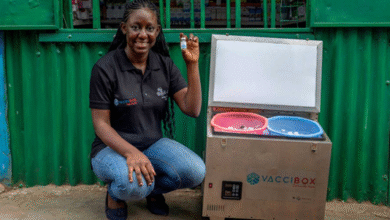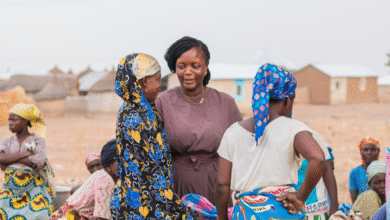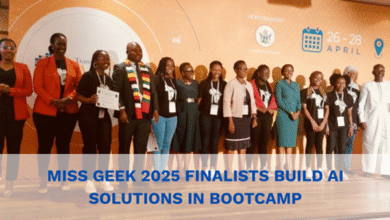Career Lucy Muchoki, Entrepreneurship to change the world
Lucy Muchoki is head of the Kenya Agro-Food and Agri-Food Industry Alliance, KAAA, an organization created to support this sector in Kenya. Besides, Lucy is advocating for women’s entrepreneurship in agriculture.
Did your childhood in an agricultural setting motivate your commitment to this sector?
I was born in a village, called Nanyuki, in a rural area. Communities in this region are both pastors and small traders. They also practice subsistence farming. As a girl, I saw women spending the whole day working on the farms, going home to cook for their entire family and taking care of the household chores alone. These women possessed neither money nor land. Despite all the work they did, they depended entirely on their husbands. On the other hand, in pastoral communities girls do not go to school. They are married very tender ages so that their fathers can inherit herds as dowries or compensation. These girls are considered as cow milk. So as a teenager, this organization of society troubled and disturbed me. For my part, I come from a privileged family and I went to school. Growing up, I was eager to study literature and history to understand our social norms. As I progressed to university, I chose to study sociology, in order to better understand the role I could play in the social structure of our communities. So, it’s clear that my career choice was influenced by my childhood. Later, I started a Masters in Business Management. With this training, I had a good curriculum to become a « social entrepreneur », with the clear goal of changing society, advocating for business models with social impact.
How did you become part of the Kenyan Agri-Food and Agri-Food Alliance?
I met colleagues who shared the same desire to change the world and to have social enterprises, at one of the largest gatherings dedicated to agriculture in Africa, African Agriculturists, in South Africa, under the auspices of the Forum for Agricultural Research in Africa (FARA) and the Apex research corpus in Africa. Together, we decided to create a pan-African consortium for agribusiness and agri-food industry (PanAAC), a continental organization charged with supporting agribusiness development on the African continent. The ultimate goal of PanAAC is to help African agribusiness stakeholders by providing them with information, knowledge, strategic partnerships and financial solutions.
We focus on small businesses. In the end, PanAAC mobilizes strategic networks involved in the agri-food and agri-food value chain in Africa to increase growth, boost productivity, promote intra-regional trade and attract direct investment in the food system. . The structures and implementation of PanAAC programs are driven by national policies. This brought me back to my home country and created the Kenyan section, « Kenya Agribusiness and Agroindustry Alliance » (KAAA), PanAAC’s national chapter. . So far, we have mobilized and registered more than 5,000 small businesses. We support them through capacity development, financing and commercial linkages.
If agriculture remains the affair of women in Africa, women face a great deal of precariousness. How do we change the situation?
The first thing we need to do is make them aware of their rights and change their mentalities. African women need to know that they also have the right to land ownership, managerial positions and quality education. Once they understand this, they must seize the opportunities offered by agriculture, a sector that provides most jobs in African economies. They must understand the profitability of business models and global market trends. Creating value added is the key to moving away from subsistence farming. For my part, I encourage women to come together and form business groups to grow together. For the sustainability of the production, the training of the groups is very important for the obtaining of quantities.
Why encourage women’s entrepreneurship to participate in their empowerment?
According to the United Nations, Africa’s agri-food industry is expected to be worth $ 1 billion by 2030. The continent has a huge domestic market and holds 60% of the world’s arable land. But Africa spends more than $ 30 billion annually on food imports. The growth margins in this sector are huge. However, skills in this area are rare. It should be known that on five small businesses, four will not spend the first year! We need to refine our entrepreneurial skills and seize these opportunities. These are numerous in post-harvest and value-added production. But for any successful business, it is essential to understand market needs and numbers.
How do you concretely accompany women entrepreneurs?
The best way to effectively support women’s entrepreneurship is through partnerships such as peer learning and mentoring programs. Western countries have been successful in ensuring food security and creating jobs. We therefore create and advocate partnerships with them to enable the transfer of innovative skills, technologies and models that will enable our women to achieve good results. At present, there are different financial programs available to support women’s businesses. Unfortunately, not all women know how and where to access this funding. As a woman who wants to support other women, I am committed to sharing the business opportunities available with them. I have also partnered with several financial institutions to help them present their projects through programs. I also work closely with public institutions to ensure that we meet the standards set by governments.






